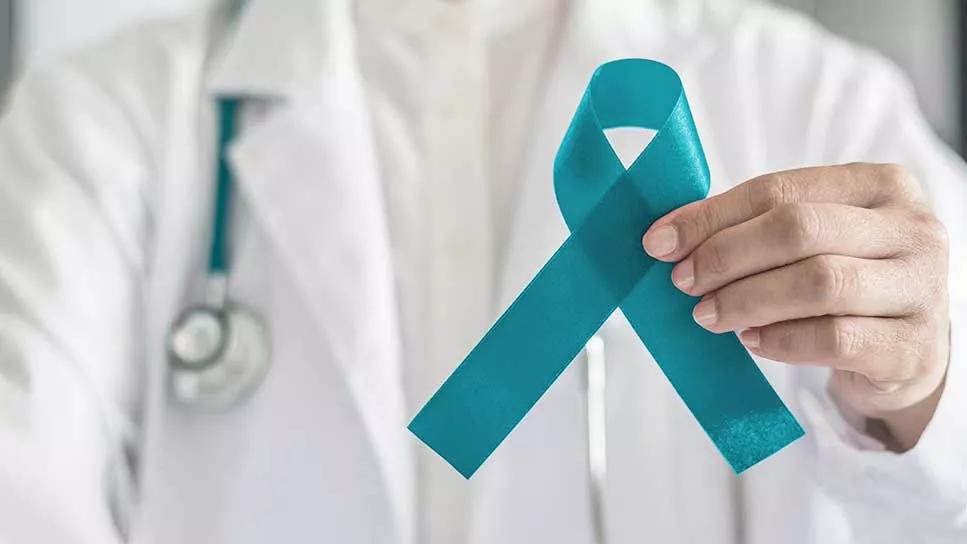While this hormonal condition can be hereditary, there are other risk factors to also consider

Image content: This image is available to view online.
View image online (https://assets.clevelandclinic.org/transform/da1de746-fc52-46ae-9712-5133c5bcde77/PCOS-Genetics-979620108-967x544-1_jpg)
Teal awareness ribbon in doctor's hand, symbolic bow color for supporting patient with PCOS
Polycystic ovary syndrome (PCOS) is the most common hormonal condition in women of reproductive age. It usually affects up to 15% of women. A diagnosis of PCOS requires at least two of the following conditions:
Advertisement
Cleveland Clinic is a non-profit academic medical center. Advertising on our site helps support our mission. We do not endorse non-Cleveland Clinic products or services. Policy
But is PCOS genetic and does it run in families?
Ob/Gyn Yolanda Thigpen, MD, explains if PCOS is passed down genetically and how early you can get a diagnosis.
Are you born with PCOS? Most cases of PCOS are genetically acquired, though the way it’s inherited is poorly understood.
But providers are beginning to see a link among genes, medical conditions and lifestyle choices that make people more susceptible to developing PCOS.
In other words, your genetic makeup doesn’t necessarily mean that you will have PCOS. It may only develop, in some cases, if other risk factors are present.
Other risk factors that may lead to developing PCOS include:
Women with PCOS also have a higher risk of depression, diabetes, high blood pressure, heart disease and endometrial cancer.
Although researchers haven’t confirmed a clear genetic link, PCOS does tend to occur in biological families, and it’s possible that particular genetic mutations contribute to whether someone develops the condition.
Advertisement
Interestingly, PCOS can be passed down from your father’s side as well. In one study, if the father had a history of heart attack or stroke, the daughters had a higher risk of PCOS. A history of diabetes in either parent doesn’t seem to be significant.
“It can be helpful to ask if anyone from both the mother and father’s side of the family have risk factors and/or symptoms consistent with PCOS,” says Dr. Thigpen.
If you have a mother or sister with PCOS or a first-degree relative with diabetes or glucose intolerance, this may mean you’re more likely to develop the condition. An estimated one-quarter of women with PCOS have mothers with the condition, and one-third have sisters with the condition.
“If you have PCOS, your daughter is at a higher risk of developing it as well,” explains Dr. Thigpen. “Signs may appear even before puberty.”
In some cases, symptoms may start during puberty.
It should be considered in an adolescent with complaints of hirsutism, treatment-resistant acne, menstrual irregularities, darkening of the skin on their neck or having obesity. But you might not know you have PCOS until you have trouble becoming pregnant or experiencing other symptoms like weight gain.
Dr. Thigpen suggests speaking to a healthcare provider, who can diagnose PCOS after an exam and discussing any symptoms you have. You may also need blood tests or an ultrasound to confirm PCOS.
“PCOS can be treated and managed. Your lifestyle habits greatly contribute to the development of the disease,” she continues.
“You’re encouraged to eat a healthy diet and exercise to maintain an ideal weight, avoid more than moderate alcohol and caffeine, and manage stress. People who have experienced infertility, irregular periods or abnormal hair growth should see a physician.”
Advertisement

Sign up for our Health Essentials emails for expert guidance on nutrition, fitness, sleep, skin care and more.
Learn more about our editorial process.
Advertisement
Hormonal imbalances and insulin resistance can cause weight to accumulate around your midsection
Diet won’t cure polycystic ovary syndrome, but healthy eating can help you feel your best
The supplement may help with weight management and blood sugar levels
PCOS can cause skin problems, but birth control pills, hormonal medications and topicals can help
The common hormonal condition is linked to insulin resistance, which can cause weight gain
Lifestyle changes, like a healthy diet and exercise, can help with fertility issues
How these lifestyle changes may help restore insulin sensitivity
It’s important to angle it toward your rectum or back, along the natural curve of your vaginal canal
Although it could be used as a moisturizer, this new trend is not recommended
Communicating clear limits helps protect your time, energy and emotional well-being
High cholesterol can be genetic, but testing and treatment can lower your heart disease risk